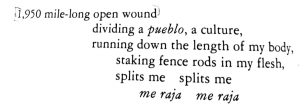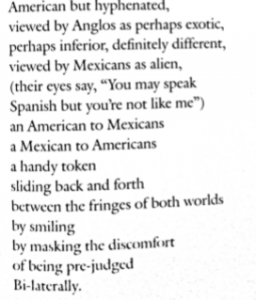During the Chicano Movement, Chicanos were faced with the dilemma of not having a “homeland” to call their own. They were struggling between the binary of being Mexican-American. They could not call Mexico home, but they also could not call America home. Within the movement, the idealization of a mystic land called Aztlān prevailed (Anzaldúa 1). Aztlān eventually became synonymous with the southwest United States and a place Chicanos could call home, and specifically the border between Mexico and the United States. The  border plays a vital role in illustrating the binary of being Mexican-American. Gloria Anzaldúa’s Borderlands opens with a poem detailing her experience and perception of the Mexico-United States Border. Within the following stanza, the reader can detect the tension within the poem. The “1,950 mile-long open wound” is a reference to the border, and the word choice indicates the pain that is manifested on the border. Anzaldúa clearly states that the border that is meant to divide the United States and Mexico divides her. Anzaldúa describes the border as “una herida abierta* where the Third World grates against the first and bleeds. And before the scab forms it hemorrhages again, the lifeblood of the two worlds merging to form a third country–a border culture” (Anzaldúa 3).
border plays a vital role in illustrating the binary of being Mexican-American. Gloria Anzaldúa’s Borderlands opens with a poem detailing her experience and perception of the Mexico-United States Border. Within the following stanza, the reader can detect the tension within the poem. The “1,950 mile-long open wound” is a reference to the border, and the word choice indicates the pain that is manifested on the border. Anzaldúa clearly states that the border that is meant to divide the United States and Mexico divides her. Anzaldúa describes the border as “una herida abierta* where the Third World grates against the first and bleeds. And before the scab forms it hemorrhages again, the lifeblood of the two worlds merging to form a third country–a border culture” (Anzaldúa 3).
Pat Mora’s “Legal Alien” also focuses on this area of tension as well without explicitly mentioning th e Mexico-United States Border. Mora begins “Bi-lingual, Bi-cultural” establishing the duality of the Chicana, of her lifestyle, and of her language. She hits the central point of tension: “American but hyphenated.” In the eyes of Americans, she is an inferior Mexican. In the eyes of Mexicans, she is an alien American. She does not have a solid space she can claim as her home. She expresses this discomfort as “sliding back and forth / between the fringes of both worlds.” Her life as a Mexican-American will constantly be subjected to “being pre-judged/ Bi-laterally.” This judgement and discomfort is unique to Chicanas, individuals without a home base.
e Mexico-United States Border. Mora begins “Bi-lingual, Bi-cultural” establishing the duality of the Chicana, of her lifestyle, and of her language. She hits the central point of tension: “American but hyphenated.” In the eyes of Americans, she is an inferior Mexican. In the eyes of Mexicans, she is an alien American. She does not have a solid space she can claim as her home. She expresses this discomfort as “sliding back and forth / between the fringes of both worlds.” Her life as a Mexican-American will constantly be subjected to “being pre-judged/ Bi-laterally.” This judgement and discomfort is unique to Chicanas, individuals without a home base.
Anzaldúa and Mora attribute different personal meanings to the label Mexican-American. Anzaldúa focuses on the physical structure of the border and its symbolic significance to her, while Mora illustrates the day-to-day realities of Chicanas. Despite the different focuses of the poem, the pain and discomfort Chicanas faced is clearly articulated in both.
Sources:
Anzaldúa Gloria. Borderlands : The New Mestiza = La Frontera. Fourth edition, 25th anniversary ed., Aunt Lute Books, 2012.
Mora, Pat. “Legal Alien.” Infinite Divisions: An Anthology of Chicana Literature. Edited by Tey Diana Rebolledo and Eliana S. Rivero, University of Arizona Press, 1993.
